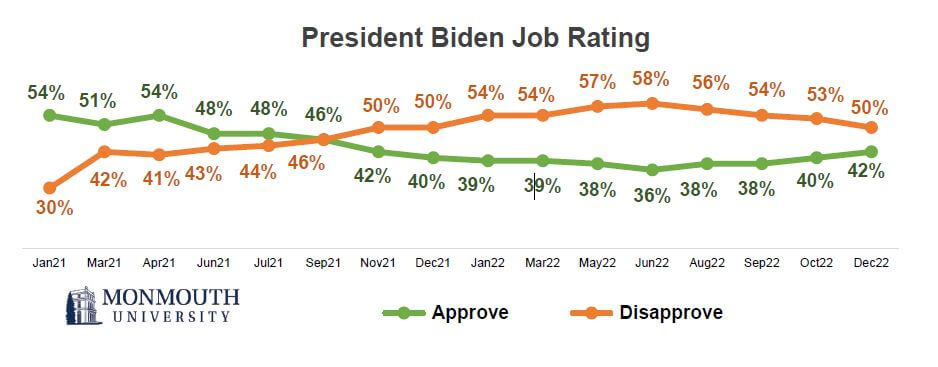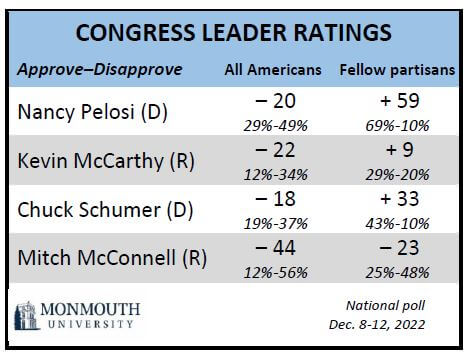West Long Branch, NJ – Fewer than 1 in 5 Americans expect that Republican control of the House of Representatives will lead to a change for the better in Washington. In fact, a majority do not foresee this leading to much change either way. The Monmouth (“Mon-muth”) University Poll also finds the public is negative toward both political parties when it comes to focusing on key economic issues, but Democrats tend to hold a more positive opinion of their party’s congressional leadership.
Just 18% of Americans expect that GOP control of the House will change Washington for the better. Another 21% say it will change for the worse, but just over half (51%) say much won’t change because of the switch in House leadership. When Democrats won control of the House in 2018 while Republicans held onto to the Senate, slightly more Americans (28%) expected to see an improvement in the way Washington worked, while 16% expected a change for the worse and 42% expected no change.
“Some pundits look at these election results and claim that Americans want divided control. I think these frequent leadership changes are more a matter of chronic dissatisfaction with Washington. Expectations for Washington getting its act together are very low when you ask Americans directly. They’ve seen this show before,” said Patrick Murray, director of the independent Monmouth University Polling Institute.
Just 36% of the public thinks it is at least somewhat likely that the new Congress will enact policies to help the middle class. When Democrats controlled both chambers at the start of President Joe Biden’s term in 2021, 58% anticipated Congress would enact middle class policies. Expectation levels were similar in 2017 (54% likely) when Republicans controlled Congress during former President Donald Trump’s administration. In both of these prior polls, about 8 in 10 partisans in the majority party (81% of Democrats in 2021 and 82% of Republicans in 2017) as well as a majority of independents (56% in 2021 and 53% in 2017) were optimistic about Congress enacting middle class policies. Now, this opinion stands at 46% likely among Republicans, 34% among independents, and 33% among Democrats.
Furthermore, about 7 in 10 Americans say neither political party is paying enough attention to everyday economic issues that affect people like them – 71% say this about the Republican Party and 68% for the Democratic Party. Overall, 26% of the public approves of the job the U.S. Congress is doing while 62% disapprove. Similarly, 28% of Americans say the country is headed in the right direction while 68% say it is on the wrong track.

Turning to the White House, 42% approve of the overall job Biden is doing as president while 50% disapprove. The current rating is a nominal improvement from prior polls this year. Biden’s rating dipped as low as 36% approve and 58% disapprove in June. His job rating shortly before the recent midterm elections was 40% approve and 53% disapprove.
None of the current party leaders in Congress earn positive ratings among the American public, although the Democrats do better among fellow partisans than the Republicans. Outgoing House Speaker Nancy Pelosi earns a negative 29% approve and 49% disapprove rating from all American adults, but gets an overwhelmingly favorable 69%–10% rating from Democrats. GOP Minority Leader Kevin McCarthy, who is hoping to succeed Pelosi in the Speaker’s chair, earns an overall negative rating of 12% approve and 34% disapprove, which includes a nominally net positive rating of 29% approve and 20% disapprove among his fellow Republicans. However, most Americans, including just over half of his fellow Republicans, have no opinion of McCarthy’s performance as party leader. Only 1 in 5 Americans have no opinion of Pelosi.

Turning to the Senate, Majority Leader Chuck Schumer earns a negative 19% approve and 37% disapprove rating from all Americans, but a positive 43%–10% rating among Democrats. Senate Minority Leader Mitch McConnell, on the other hand, is the least popular of the four leaders, earning clearly negative ratings from the public as a whole (12%-56%) as well as among his fellow Republicans (25%–48%). Current ratings for Pelosi, Schumer, and McConnell are in line with polling over the past three years. This is the first time Monmouth has asked about McCarthy.
“Pelosi may have been a lightning rod for Republicans over the past twenty years, but she has clearly earned the admiration of her fellow Democrats. McCarthy starts off as a blank slate for most of the public. It will be interesting to see if he can build the same kind of party loyalty as Pelosi – that is if he actually gets the chance to succeed her,” said Murray, adding, “McCarthy could end up as unpopular as McConnell, but public disdain for the Senate GOP leader is due in part to his ruthlessness in holding onto power. It’s not clear whether McCarthy is made of the same stuff.”
The Monmouth University Poll was conducted by telephone from December 8 to 12, 2022 with 805 adults in the United States. The question results in this release have a margin of error of +/- 5.0 percentage points for the full sample. The poll was conducted by the Monmouth University Polling Institute in West Long Branch, NJ.
QUESTIONS AND RESULTS
(* Some columns may not add to 100% due to rounding.)
1.Do you approve or disapprove of the job Joe Biden is doing as president?
| TREND: | Dec. 2022 | Oct. 2022 | Sept. 2022 | Aug. 2022 | June 2022 | May 2022 | March 2022 | Jan. 2022 |
| Approve | 42% | 40% | 38% | 38% | 36% | 38% | 39% | 39% |
| Disapprove | 50% | 53% | 54% | 56% | 58% | 57% | 54% | 54% |
| (VOL) No opinion | 8% | 7% | 8% | 7% | 6% | 5% | 7% | 7% |
| (n) | (805) | (808) | (806) | (808) | (978) | (807) | (809) | (794) |
| TREND: Continued | Dec. 2021 | Nov. 2021 | Sept. 2021 | July 2021 | June 2021 | April 2021 | March 2021 | Jan. 2021 |
| Approve | 40% | 42% | 46% | 48% | 48% | 54% | 51% | 54% |
| Disapprove | 50% | 50% | 46% | 44% | 43% | 41% | 42% | 30% |
| (VOL) No opinion | 11% | 9% | 8% | 8% | 9% | 5% | 8% | 16% |
| (n) | (808) | (811) | (802) | (804) | (810) | (800) | (802) | (809) |
2.Do you approve or disapprove of the job the U.S. Congress is doing?
| TREND: | Dec. 2022 | Oct. 2022 | Sept. 2022 | Aug. 2022 | June 2022 | May 2022 | March 2022 | Jan. 2022 | Dec. 2021 | Nov. 2021 | Sept. 2021 | July 2021 | June 2021 | April 2021 | March 2021 | Jan. 2021 |
| Approve | 26% | 23% | 23% | 17% | 15% | 15% | 21% | 19% | 23% | 18% | 22% | 23% | 21% | 35% | 30% | 35% |
| Disapprove | 62% | 69% | 66% | 74% | 78% | 77% | 71% | 74% | 66% | 70% | 65% | 62% | 65% | 56% | 59% | 51% |
| (VOL) No opinion | 12% | 8% | 11% | 9% | 7% | 8% | 8% | 6% | 11% | 12% | 13% | 15% | 15% | 9% | 11% | 14% |
| (n) | (805) | (808) | (806) | (808) | (978) | (807) | (809) | (794) | (808) | (811) | (802) | (804) | (810) | (800) | (802) | (809) |
| TREND: Continued | Nov. 2020 | Early June 2020 | May 2020 | April 2020 | Feb. 2020 | Jan. 2020 | Dec. 2019 | Nov. 2019 | Sept. 2019 | Aug. 2019 | June 2019 | May 2019 | April 2019 | March 2019 | Jan. 2019 |
| Approve | 23% | 22% | 32% | 32% | 20% | 24% | 22% | 23% | 21% | 17% | 19% | 20% | 24% | 23% | 18% |
| Disapprove | 64% | 69% | 55% | 55% | 69% | 62% | 65% | 64% | 68% | 71% | 69% | 71% | 62% | 68% | 72% |
| (VOL) No opinion | 13% | 9% | 13% | 13% | 11% | 14% | 13% | 13% | 11% | 13% | 12% | 9% | 14% | 9% | 10% |
| (n) | (810) | (807) | (808) | (857) | (902) | (903) | (903) | (908) | (1,161) | (800) | (751) | (802) | (801) | (802) | (805) |
| TREND: Continued | Nov. 2018 | Aug. 2018 | June 2018 | April 2018 | March 2018 | Jan. 2018 | Dec. 2017 | Sept. 2017 | Aug. 2017 | July 2017 | May 2017 | March 2017 | Jan. 2017 |
| Approve | 23% | 17% | 19% | 17% | 18% | 21% | 16% | 17% | 18% | 19% | 19% | 25% | 23% |
| Disapprove | 63% | 69% | 67% | 71% | 72% | 68% | 65% | 69% | 69% | 70% | 68% | 59% | 66% |
| (VOL) No opinion | 14% | 14% | 14% | 12% | 11% | 11% | 19% | 15% | 13% | 11% | 13% | 16% | 11% |
| (n) | (802) | (805) | (806) | (803) | (803) | (806) | (806) | (1,009) | (805) | (800) | (1,002) | (801) | (801) |
| TREND: Continued | Sept. 2016* | Aug. 2016* | June 2016* | March 2016 | Jan. 2016 | Dec. 2015 | Oct. 2015 | Sept. 2015 | Aug. 2015 | July 2015 | June 2015 | April 2015 | Jan. 2015 | Dec. 2014 | July 2013 |
| Approve | 15% | 14% | 17% | 22% | 17% | 16% | 17% | 19% | 18% | 18% | 19% | 21% | 18% | 17% | 14% |
| Disapprove | 77% | 78% | 76% | 68% | 73% | 73% | 71% | 71% | 72% | 69% | 71% | 67% | 70% | 73% | 76% |
| (VOL) No opinion | 8% | 9% | 7% | 10% | 10% | 10% | 12% | 11% | 11% | 12% | 10% | 12% | 11% | 11% | 10% |
| (n) | (802) | (803) | (803) | (1,008) | (1,003) | (1,006) | (1,012) | (1,009) | (1,203) | (1,001) | (1,002) | (1,005) | (1,003) | (1,008) | (1,012) |
* Registered voters
[QUESTIONS 3 & 4 WERE ROTATED]
3.Do you approve or disapprove of the job Chuck Schumer is doing as Senate Majority Leader, or do you have no opinion of him?
| TREND: | Dec. 2022 | Nov. 2021 | April 2018* | July 2017* |
| Approve | 19% | 21% | 16% | 17% |
| Disapprove | 37% | 37% | 29% | 28% |
| No opinion | 44% | 43% | 55% | 55% |
| (n) | (805) | (811) | (803) | (800) |
*Question wording was: “as Senate Minority Leader?”
4.Do you approve or disapprove of the job Nancy Pelosi is doing as Speaker of the House, or do you have no opinion of her?
| TREND: | Dec. 2022 | Nov. 2021 | Jan. 2020 | Nov. 2019 | Jan. 2019 | Nov. 2018* | April 2018* | July 2017* |
| Approve | 29% | 28% | 35% | 31% | 34% | 17% | 17% | 17% |
| Disapprove | 49% | 49% | 43% | 45% | 45% | 38% | 44% | 42% |
| No opinion | 22% | 22% | 22% | 24% | 21% | 45% | 39% | 41% |
| (n) | (805) | (811) | (903) | (908) | (805) | (802) | (803) | (800) |
*Question wording was: “as House Minority Leader?”
[QUESTIONS 5 & 6 WERE ROTATED]
5.Do you approve or disapprove of the job Mitch McConnell is doing as Senate Minority Leader, or do you have no opinion of him?
| TREND: | Dec. 2022 | Jan. 2020* | Nov. 2019* | Jan. 2019* | Nov. 2018* | April 2018* | July 2017* |
| Approve | 12% | 21% | 15% | 15% | 15% | 10% | 12% |
| Disapprove | 56% | 39% | 39% | 40% | 28% | 38% | 38% |
| No opinion | 32% | 40% | 46% | 45% | 57% | 52% | 49% |
| (n) | (805) | (903) | (908) | (805) | (802) | (803) | (800) |
*Question wording was: “as Senate Majority Leader?”
6.Do you approve or disapprove of the job Kevin McCarthy is doing as House Minority Leader, or do you have no opinion of him?
| Dec. 2022 | |
| Approve | 12% |
| Disapprove | 34% |
| No opinion | 54% |
| (n) | (805) |
7.Would you say things in the country are going in the right direction, or have they gotten off on the wrong track?
| TREND: | Dec. 2022 | Sept. 2022 | Aug. 2022 | June 2022 | May 2022 | March 2022 | Jan. 2022 | Dec. 2021 | Nov. 2021 | Sept. 2021 | July 2021 | June 2021 | April 2021 | March 2021 | Jan. 2021 |
| Right direction | 28% | 23% | 15% | 10% | 18% | 24% | 24% | 30% | 31% | 29% | 38% | 37% | 46% | 34% | 42% |
| Wrong track | 68% | 74% | 82% | 88% | 79% | 73% | 71% | 66% | 64% | 65% | 56% | 57% | 50% | 61% | 51% |
| (VOL) Depends | 2% | 2% | 1% | 1% | 2% | 1% | 3% | 1% | 2% | 4% | 3% | 3% | 2% | 4% | 3% |
| (VOL) Don’t know | 3% | 2% | 2% | 1% | 2% | 2% | 2% | 3% | 3% | 2% | 4% | 3% | 2% | 2% | 4% |
| (n) | (805) | (806) | (808) | (978) | (807) | (809) | (794) | (808) | (811) | (802) | (804) | (810) | (800) | (802) | (809) |
| TREND: Continued | Nov. 2020 | Early Sept. 2020 | Aug. 2020 | Late June 2020 | Early June 2020 | May 2020 | April 2020 | March 2020 | Feb. 2020 | Jan. 2020 |
| Right direction | 26% | 27% | 22% | 18% | 21% | 33% | 30% | 39% | 37% | 37% |
| Wrong track | 68% | 66% | 72% | 74% | 74% | 60% | 61% | 54% | 57% | 56% |
| (VOL) Depends | 4% | 4% | 4% | 5% | 4% | 4% | 5% | 4% | 6% | 6% |
| (VOL) Don’t know | 2% | 3% | 2% | 3% | 1% | 3% | 5% | 3% | 1% | 1% |
| (n) | (810) | (867) | (868) | (867) | (807) | (808) | (857) | (851) | (902) | (903) |
| TREND: Continued | Dec. 2019 | Nov. 2019 | Sept. 2019 | Aug. 2019 | June 2019 | May 2019 | April 2019 | March 2019 | Nov. 2018 | Aug. 2018 | June 2018 | April 2018 | March 2018 | Jan. 2018 |
| Right direction | 32% | 30% | 30% | 28% | 31% | 29% | 28% | 29% | 35% | 35% | 40% | 33% | 31% | 37% |
| Wrong track | 56% | 61% | 61% | 62% | 62% | 63% | 62% | 63% | 55% | 57% | 53% | 58% | 61% | 57% |
| (VOL) Depends | 8% | 7% | 6% | 8% | 6% | 4% | 7% | 6% | 7% | 6% | 3% | 5% | 6% | 3% |
| (VOL) Don’t know | 4% | 2% | 2% | 2% | 2% | 3% | 3% | 2% | 3% | 3% | 3% | 4% | 1% | 3% |
| (n) | (903) | (908) | (1,161) | (800) | (751) | (802) | (801) | (802) | (802) | (805) | (806) | (803) | (803) | (806) |
| TREND: Continued | Dec. 2017 | Aug. 2017 | May 2017 | March 2017 | Jan. 2017 | Aug. 2016* | Oct. 2015 | July 2015 | June 2015 | April 2015 | Dec. 2014 | July 2013 |
| Right direction | 24% | 32% | 31% | 35% | 29% | 30% | 24% | 28% | 23% | 27% | 23% | 28% |
| Wrong track | 66% | 58% | 61% | 56% | 65% | 65% | 66% | 63% | 68% | 66% | 69% | 63% |
| (VOL) Depends | 7% | 4% | 5% | 4% | 4% | 2% | 6% | 5% | 5% | 5% | 5% | 5% |
| (VOL) Don’t know | 3% | 5% | 3% | 5% | 2% | 3% | 4% | 3% | 3% | 2% | 3% | 4% |
| (n) | (806) | (805) | (1,002) | (801) | (801) | (803) | (1,012) | (1,001) | (1,002) | (1,005) | (1,008) | (1,012) |
* Registered voters
8.As you may know, the Republicans won control of the House of Representatives in last month’s election. Do you think this will change the way Washington works or won’t much change? [If CHANGE:Will things get better or get worse?]
| COMPARISON: | Dec. 2022 | Nov. 2018* | |||
| Will change, get better | 18% | 28% | |||
| Will change, get worse | 21% | 16% | |||
| Will change, not sure if better or worse | 5% | 11% | |||
| Won’t much change | 51% | 42% | |||
| (VOL) Don’t know | 5% | 3% | |||
| (n) | (805) | (802) | |||
* 2018 poll asked about Democrats winning control of the House of Representatives.
9.How likely is it that the new Congress will enact policies to help the middle class – very, somewhat, not too, or not at all likely?
| TREND: | Dec. 2022 | Jan. 2021* | Jan. 2017* | July 2013* |
| Very likely | 7% | 14% | 18% | 4% |
| Somewhat likely | 29% | 44% | 36% | 26% |
| Not too likely | 26% | 18% | 20% | 30% |
| Not at all likely | 34% | 21% | 24% | 38% |
| (VOL) Don’t Know | 4% | 2% | 2% | 2% |
| (n) | (805) | (809) | (801) | (1,012) |
*Question wording was: “How likely is it that Congress will…”
[QUESTIONS 10 &11 WERE ROTATED]
10.Does the Republican Party pay too much, the right amount, or not enough attention to everyday economic issues that affect people like you?
| TREND: | Dec. 2022 | Nov. 2021 | Nov. 2018 | March 2017 |
| Too much | 3% | 4% | 3% | 4% |
| Right amount | 22% | 23% | 30% | 28% |
| Not enough | 71% | 69% | 63% | 63% |
| (VOL) Don’t know | 4% | 5% | 4% | 4% |
| (n) | (805) | (811) | (802) | (801) |
11.Does the Democratic Party pay too much, the right amount, or not enough attention to everyday economic issues that affect people like you?
| TREND: | Dec. 2022 | Nov. 2021 | Nov. 2018 | March 2017 |
| Too much | 3% | 4% | 4% | 5% |
| Right amount | 24% | 25% | 26% | 25% |
| Not enough | 68% | 69% | 64% | 65% |
| (VOL) Don’t know | 5% | 3% | 6% | 5% |
| (n) | (805) | (811) | (802) | (801) |
[Q12-29 held for future release.]
METHODOLOGY
The Monmouth University Poll was sponsored and conducted by the Monmouth University Polling Institute from December 8 to 12, 2022 with a probability-based national random sample of 805 adults age 18 and older. This includes 281 contacted by a live interviewer on a landline telephone and 524 contacted by a live interviewer on a cell phone, in English. Telephone numbers were selected through a mix of random digit dialing and list-based sampling. Landline respondents were selected with a modified Troldahl-Carter youngest adult household screen. Interviewing services were provided by Braun Research, with sample obtained from Dynata (RDD, n=590), Aristotle (list, n=152) and a panel of prior Monmouth poll participants (n=63). Monmouth is responsible for all aspects of the survey design, data weighting and analysis. The full sample is weighted for region, age, education, gender and race based on US Census information (ACS 2018 one-year survey). For results based on this sample, one can say with 95% confidence that the error attributable to sampling has a maximum margin of plus or minus 5.0 percentage points (adjusted for sample design effects). Sampling error can be larger for sub-groups (see table below). In addition to sampling error, one should bear in mind that question wording and practical difficulties in conducting surveys can introduce error or bias into the findings of opinion polls.
DEMOGRAPHICS (weighted) |
| Self-Reported |
| 26% Republican |
| 43% Independent |
| 31% Democrat |
| 49% Male |
| 51% Female |
| 30% 18-34 |
| 33% 35-54 |
| 37% 55+ |
| 64% White |
| 11% Black |
| 16% Hispanic |
| 9% Asian/Other |
| 69% No degree |
| 31% 4 year degree |
Click on pdf file link below for full methodology and crosstabs by key demographic groups.




